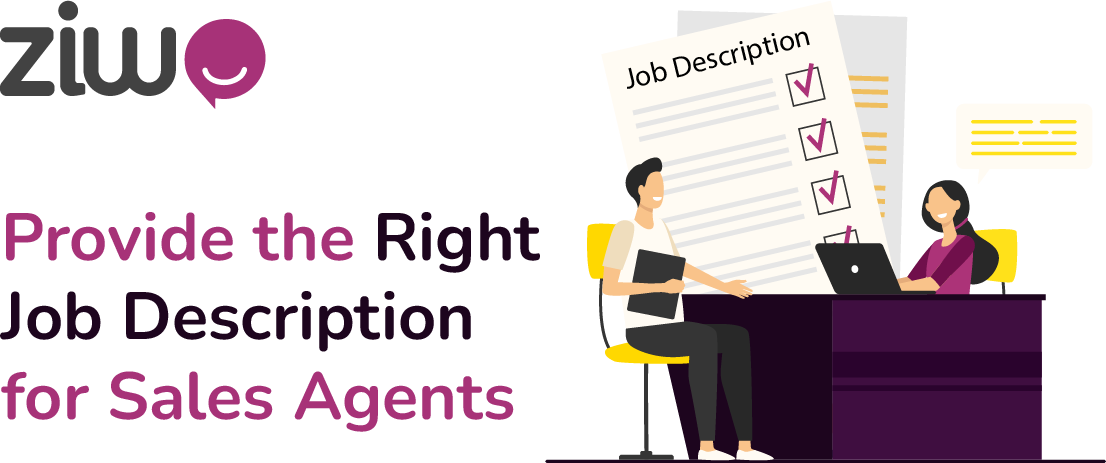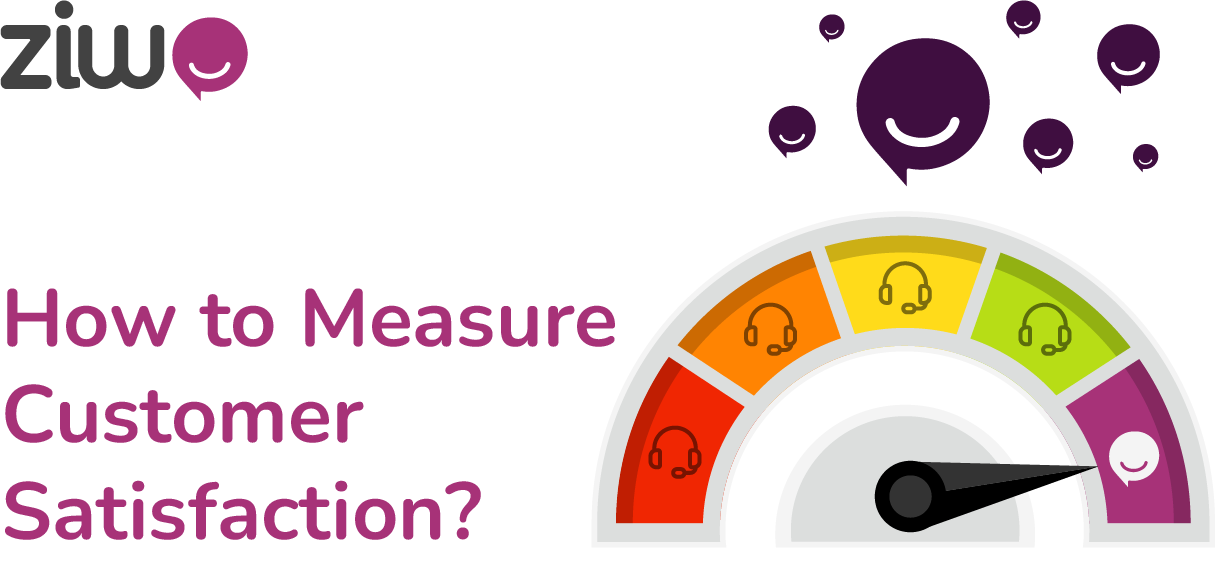

Sales Agent Job Description Template
Whether your business model is based on product offering or service providing, you won’t be able to offer these deliverables without direct communication between your party and the targeted client.
Here comes the sales agent’s role!
The sales agent communicates and explains the product's specifications, features, and benefits. The agent should also help the prospect explore how the product will solve his problem.
To hire the perfect candidate, you should recognize all the details related to the sales agent job description.
That’s why Ziwo offers you a comprehensive sales agent job description that you can utilize for the upcoming sales vacancy. Read the article till the end to deliver the template that attracts excellent sales agents to apply for the job.
What is a Sales Agent?
A sales agent is a crucial individual in any corporation responsible for managing products and services and showcasing them in the most suitable way to attract qualified prospects.
The sales agent offers the products/services as an excellent solution for individuals' or businesses' problems/pain points.
While managing the relationship with the client, the sales agent uses all his capabilities to convince the client to purchase the product or the service suitable for the condition.
Types of Sales Agent Jobs
A sales agent might differ from one business model to another. Selling a service differs from selling a product. Also, providing services to a business varies from offering services to an individual. Moreover, traditional selling in brick-and-mortar stores is different from online stores. That’s why we will discuss the significant differences between sales agent jobs.
1- Telesales Agent
A sales agent is an individual who is responsible for communicating with customers who have shown interest in similar products in the past. The sales agent showcases the product's features and specifications.
Whenever the customer accepts the offer, the sales agent issues a PO so that the customer can receive their purchases via home delivery or by collecting the products from the store branch.
2- Sales Associate
A sales associate is in charge of welcoming the customer and sending greetings in a retail store, car dealing agencies, and other businesses where the customer needs to be present to check the product quality, experience it himself, and get his satisfaction. Here, the agent's role is to determine the customer's needs and guide him to the nearest solutions that meet them.
3- Marketing Development Representative (MDR)
MDRs, SDRs, and account executives are widely spread jobs now part of large enterprises serving individuals and businesses. Most jobs relate to marketing agencies, real estate brokerages, and other business consultancy.
In this case, the sales agent’s role is to customize a suitable solution that interacts with the client’s issues and meets their budget.
On the contrary of the previous job types, the selling process takes a lot of time as it needs to build a strong relationship with the customer based on trust.
This is because these kinds of services are always expensive compared to others. Also, they directly connect to the client, affecting his financial stability, whether it’s an individual or a corporation. Thus, the decision-making takes more time.
On the other hand, the sales agent does not commit to a specific communication platform with the customer. For example, he might use a call center solution that manages the voice calls and integrates them into a CRM system.
This allows the agent to manage all the customers’ interactions, such as WhatsApp, social media platforms, SMS, and more, using the same platform from a single interface. Moreover, the client might need to meet with the sales agent face-to-face.
Sales Agent Duties
Sales agents perform many duties, but they differ according to the niche and the job type, as previously mentioned. In this section, we illustrate the everyday duties and requirements of any sales agent:
1- Establishing a Strong Relationship With the Prospect
Building trust needs time and varies from one client to another. When the prospect decides to purchase, he buys based on persuasion, which refers to the agent’s success in gaining his trust. Any salesperson’s mindset should be based on helping the prospect, not just selling products and services for revenue.
A strong relationship is sourced from transparency; the client interacts positively with appreciation, and the agent is concerned about his issues.
The salesperson should also inform the customer of potential challenges and ways to deal with them. This advice should be based on personal experience or attendance at similar events.
So, awareness and teaching the client how to deal effectively in every situation can help the client earn more profit or lead a better life.
2- Maintaining Current Customer Relationships
Some say maintaining the customer relationship with the business is customer service, as the sales agent is responsible for after-sale processes. The sales agent has a crucial role; what is it?
When the follow-up is from the same individual who sold the product, the customer trusts your company more.
This regular follow-up might lead to a new need discovery, a service you deliver in return. The sales agent should remember that the customer is not a means to achieve the required target but a human being with aims and developing needs that change over time.
Initiating communication with the customer might lead to your success as the first to provide this service to him, making your service a reference point for him compared to similar services.
The follow-up could involve helping with a recent issue or a recently revealed need. In this situation, the customer feels appreciated because he’s being helped before expressing this need.
3- Market Analysis and Knowing Its Updates Regularly
What is the relation between a sales agent and the market analysis process? Isn’t it the marketing team’s responsibility?
Marketing deals with every variable and any new factor in the market and attracts a new class of targeted audience. However, the salesperson is the first to feel any change in the market's direction.
So, the agent can ask the customer why another competitor has been chosen. When this situation is repeated, the sales agent notifies the management of the need to modify or develop action to avoid losing more clients.
4- Upgrading Successful Deals to New Levels
Sales is not only about prospecting new leads but also about loyal customers. Many studies state that it’s easier to let loyal customers buy new products than to encourage a new lead to do the same. So, customers who have previously made purchases always have a higher probability of success.
Know that investing in customer retention always results in their satisfaction. Thus, it becomes easier to upgrade their deals through upselling or cross-selling.
For example, your company is a SaaS business. Upselling is implemented by offering more users access and reducing the subscription fee per user.
Cross-selling is done by selling products related to the original product that the customer requires. This happens by adding a small amount to the already agreed amount.
If we continue with the previous example, your client needs a contact center solution; however, you offer a simple chatbot as an add-on integrated with the requested solution. Now, the user can enjoy all the communication features from a single platform.
How Does a Sales Agent Work?
Any sales agent action work plan includes seven fixed steps as follows:
1- Prospecting
It’s the process where the sales agent determines the qualities and qualifications of the perfect lead and knows how your services will efficiently cover their needs. If you’re selling to companies, is the decision maker a small business owner or a department manager in a medium/large enterprise?
If the sales agent deals with consumers, to which age group does the ideal customer belong? Is it an age group that is less than 30 years old? Is it older than 50 years? To which social class does the consumer belong? What is the average income of an individual capable of purchasing such a product?
The marketing team uses previous qualities to build their buyer persona and target multiple channels. Therefore, the agent should study these qualities and compare them to the actual ones when the imaginary person becomes a flesh-and-blood customer.
2- Preparation
Now, the sales agent has got a list of laeds that he should approach as soon as possible. Before contacting the leads, he should take some considerations and plan the deals in accordance with them. The source of theses considerations come from the data gathered by the marketing team through the signup forms and other forms that collect important data to your business that appear to the leads.
So, the sales agents might review data such as:
- Lead Name
- Mobile Phone
- Job Title
- Company Name
- Industry
By revising the gathered information, the sales agent can forecast the business size, its market share, its needs, and any other crucial element to customize a deal that will be suitable option for the client.
3- Approach
The sales agent transfers to the next activity, from the prediction to the facts, by directly communicating with the client and determining his needs and the issues he might face. Communication mainly occurs more than once at close or far time intervals.
During the approach period, the salesperson gets to know significant elements that are closing deal triggers, including:
- Price
- Quality
- Unlimited Features
- After-sales services
The salesperson learns from the client about the offers other competitors might offer him. This helps the agent determine the best offer he can make without affecting the company’s targeted profit margin, which qualifies him to develop a fantastic pitch.
4- Pitching
The critical step in any sales agent's action plan is how he offers a customized solution to help the client solve his issue. After recognizing the problems and the concerns the client has and the offers he has already received, your sales agent’s pitch should include a strength point that touches one of the clients’ interests or all:
- The cheapest price
- Urgency
- We feature an extra service free of charge or at a low fee.
- Customized pitch that can not be suitable for other clients of different statuses.
5- Objection Handling
You don’t expect the client to accept the deal on the first try. That’s why the sales agent has to manage all the objections the client has delivered during the pitch. Not all objections are real; some might be made up to push the agent and achieve the maximum benefit he can offer.
So, the sales agent will deal wisely with the actual objections to avoid losing a client after investing a lot of time and effort, avoid losses the company might face, or even achieve an unsatisfying profit margin.
6- Deal Closing
After a long negotiation, your sales agent has reached a win-win situation. The contracts are ready for signatures and shared according to the traditional method.
Once the client signs and sends the agreed amount, the deal is added to the agent’s balance in terms of sales and the number of deals he has closed during the month. This makes him fewer steps away from achieving the target.
7- Follow-up
The relationship between the sales agent and the customer doesn’t end when the deal is closed. It’s preferred that the agent follow up after the deal closes for a certain amount, which might range between one month and three months. This way, he can determine the customer’s notes about the product or service and provide a suitable customer service agent in case of any problems.
Sales Agent Skills
The qualities of an excellent sales agent include skills that would be better suited to every employee, but they’re essential for the sales agent. They include:
1- Communication
A sales agent’s core skill is delivering crucial information clearly and simply to the customer. Excellent communication skills ensure that there will be no misunderstanding or contradiction.
It’s about verbal communication, texting skills, and body language during office meetings, which are essential to support your company’s perception and brand voice.
A sales representative only sometimes sends messages and makes calls; he also receives customer calls. In this case, he must actively listen to comprehend the customer's needs and pain points and deliver suitable solutions accurately.
2- Time Management
A sales agent does not manage a single deal, one after the other; he manages multiple deals and his relationship with more than one customer simultaneously.
The agent divides his time according to each case's needs. Some leads need a little push to close the deal and avoid losing interest, while other prospects might need time to decide, as they need to consult other parties and compare multiple available options. The sales agent deals based on the personality he contacts and the condition of the expected deal.
Also, the expected revenue from some deals might double or triple that of other deals. So, the agent has to develop a balance that preserves every connection to prevent losing all deals without achieving any profit.
3- Problem Solving
One of the skills you must pay attention to in the sales agent you hire is problem-solving. Any service or product is a solution to a problem the prospect is facing, or to a need he must cover and deal with.
The prospect has an issue or a gap that he expects your company to solve. Based on the depth of the sales agent’s comprehension of your business solutions, he tries to customize them to deal with the pain point or the need 100%.
4- Multi-tasking
The sales agent is not only for direct communication and deal closing; he needs to schedule his plan, analyze the customers' contacts and conversations he started, and determine how good they were and whether they included details the first time he noticed.
As we mentioned, he manages several deals at the same time. So, his schedule for a day might include conducting five cold calls, following up with three prospects, and finalizing two deals for closing.
The agent might need to develop presentations himself for pitching or sending quotations. He also coordinates with the accounting department to create the invoice that the client should receive.
5- Negotiation
It’s a talent that no one can ignore, as it might lead to a successful deal or turn into a big loss. As not every closed deal could be profitable for your business. Considering negotiation, the agent should interact positively with the client to achieve his expectations within the profit margin of the business targets.
Sales Agent Job Description Template Elements
The Sales agent job description template includes elements like:
- Company Summary
- Job brief
- Job Responsibilities
- Competencies and skills
- Qualifications
- Benefits
- Company Location (If available)
- Contact info
Who Benefits From the Sales Agent Job Description Template?
Many parties benefit from the job description of the sales agent, for instance:
- Recruitment specialist in an HR department
- Sales team leader or supervisor
- Sales manager
- Business owner
Other Templates





